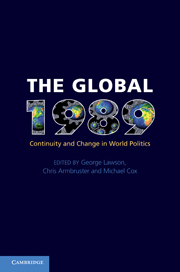
-
Select format
-
- Publisher:
- Cambridge University Press
- Publication date:
- 05 June 2012
- 23 September 2010
- ISBN:
- 9780511778544
- 9780521761246
- 9780521147910
- Dimensions:
- (228 x 152 mm)
- Weight & Pages:
- 0.67kg, 338 Pages
- Dimensions:
- (228 x 152 mm)
- Weight & Pages:
- 0.55kg, 338 Pages
You may already have access via personal or institutional login
Book description
1989 signifies the collapse of Soviet communism and the end of the Cold War, a moment generally recognized as a triumph for liberal democracy and when capitalism became global. The Global 1989 challenges these ideas. An international group of prominent scholars investigate the mixed, paradoxical and even contradictory outcomes engendered by these events, unravelling the intricacies of this important moment in world history. Although the political, economic and cultural orders generated have, for the most part, been an improvement on what was in place before, this has not always been clear cut: 1989 has many meanings, many effects and multiple trajectories. This volume leads the way in defining how 1989 can be assessed both in terms of its world historical impact and in terms of its contribution to the shape of contemporary world politics.
Reviews
‘This volume offers a seminal and strikingly original reinterpretation of the end of the Cold War. It provides not only a refreshing and revealing look back at 1989, but also a remarkably insightful look forward to the lasting impact of 1989 on the future of global politics.’
Charles A. Kupchan - Georgetown University and Council on Foreign Relations, author of How Enemies Become Friends
‘Like many joyous moments, 1989 has had diverse, unexpected and not always beneficial consequences. The editors of this volume ask all the right questions about 1989 as a turning point and the contributors provide many intelligent and provocative answers.’
Richard Ned Lebow - James O. Freedman Presidential Professor, Dartmouth College and Centennial Professor, London School of Economics and Political Science
‘This impressive collection of essays examines the place in global history of the revolutionary events of 1989, but it will also interest anyone attempting to theorize the overall trajectory of contemporary societies.’
Michael Mann - Professor of Sociology, University of California, Los Angeles
‘This excellent book should be widely read and pondered because it addresses one of the most important issues of our time: why the triumphalism of 1989 has given way to a growing pessimism about the future of world politics.’
John J. Mearsheimer - R. Wendell Harrison Distinguished Service Professor of Political Science, University of Chicago
‘This book brings together a distinguished group of scholars to illuminate an important subject whose larger significance policymakers, scholars and the broader reading public think they understand but probably don’t. Nearly anyone who thinks much about politics has a take on the meaning of 1989. Lawson, Armbruster, Cox and their collaborators are here to tell you that what you think you know about the implications of the Cold War’s and Euro-Eurasian communism’s collapse rests on tenuous conceptual or empirical foundations, or probably both.’
William C. Wohlforth - Daniel Webster Professor, Dartmouth College and Editor in Chief, Security Studies
'… in The global 1989, editors George Lawson, Chris Armbruster and Michael Cox have put together a collection of compelling essays about the end of the Cold War …'
Campbell Craig Source: International Affairs
Contents
Metrics
Altmetric attention score
Full text views
Full text views help Loading metrics...
Loading metrics...
* Views captured on Cambridge Core between #date#. This data will be updated every 24 hours.
Usage data cannot currently be displayed.
Accessibility standard: Unknown
Why this information is here
This section outlines the accessibility features of this content - including support for screen readers, full keyboard navigation and high-contrast display options. This may not be relevant for you.
Accessibility Information
Accessibility compliance for the PDF of this book is currently unknown and may be updated in the future.


